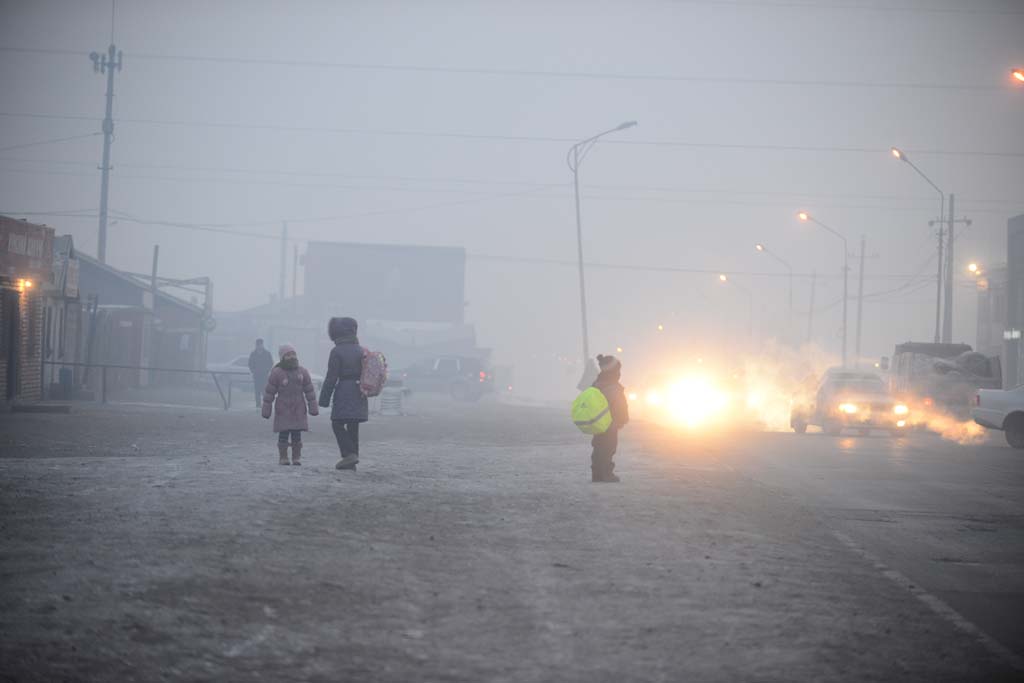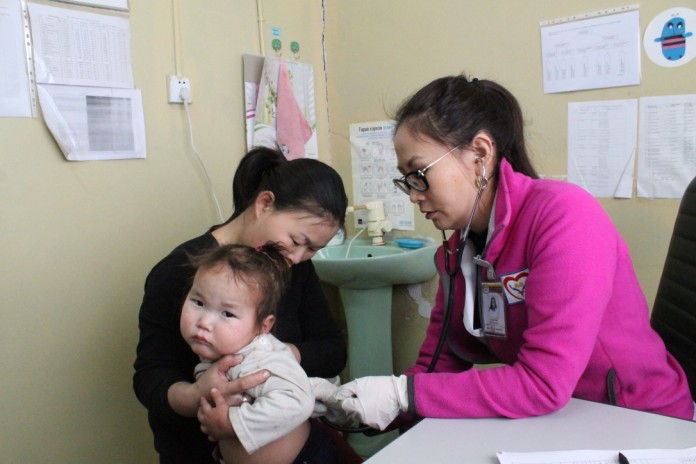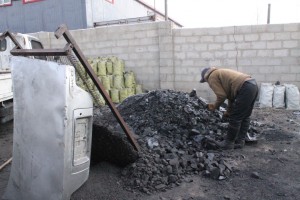Ulaanbaatar's silent killer
Source: http://theubpost.mn/2016/12/14/ulaanbaatars-silent-killer-2/
At a small medical clinic on the outskirts of Ulaanbaatar’s ger district, the waiting room is full of mothers and fathers cradling their sick children. One baby vomits in the hallway, while another tiny boy struggles to breathe, wheezing and gasping for air. The three-room Orkhon Tushee Murun medical center in the 17th Khoroo of Bayanzurkh
District sees 115 patients a day. Around 30 to 40 patients are children who have symptoms of pneumonia. The clinic’s head doctor, Dr. B.Ankhtuya, is nervous. Last month on a home visit, she watched the death of a one-month-old girl from pneumonia. 
Dr. Ankhtuya is bracing for a dramatic increase in patients over the next four months. She attributes the increase in pneumonia cases to air pollution exposure, which is causing infant disease and deaths, and long-term lung damage. “In the morning and evening, this area has a smoke-like fog, and children are badly affected by this air pollution,” Dr. Ankhtuya said.
“Most of the families living here are low-income. They are not burning coal, they are burning plastics, rubbish and car tyres to keep warm,” she said. “When I visit families, sometimes it is very cold inside in the house, and others are warm, so it depends on their financial situation.” Pneumonia is the second most common cause of infant and under-five mortality in Mongolia, accounting for 15 percent of infant deaths. For adults, air pollution-related diseases – Ischemic heart disease, stroke and chronic obstructive pulmonary disease – were the top three causes of premature death in 2013.

Head doctor B. Ankhtuya treats a child with pneumonia at the Orkhon Tushee Murun medical center in the Bayanzurkh district.
Ulaanbaatar is one of the most polluted cities in the world. The primary indicator of air pollution impacts on human health, PM 2.5, is at a level seven times higher than World Health Organization (WHO) guidelines, and the prediction is that air pollution will only get worse in the next 10 years. A report released this month by the United Nations Children’s Fund (UNICEF), the Public Health Institute of Mongolia and the Association of Public Health Professionals titled “Understanding and addressing the impact of air pollution on children’s health in Mongolia” warned air pollution in Ulaanbaatar had now reached “critical” levels. Air pollution in Ulaanbaatar is caused by a combination of high emissions, rapid and unplanned urbanization in the ger district and the city’s unique geography and climate. Sixty percent of Ulaanbaatar’s population lives in the ger district and residents rely on coal-burning stoves to heat their homes and for cooking. This is the source of 70 percent of PM 2.5 in Ulaanbaatar, with power plants, vehicles and industry making up the rest, according to a World Bank report.
While outdoor air pollution is a killer, many do not know that indoor air pollution causes more deaths. Studies show that Mongolian adults and children spend 90 percent of their time indoors during winter; either at home, work or school. It’s these indoor environments that dominate exposure to air pollution and the resultant health impacts.
Through the cries of children waiting outside her door for treatment, Dr. Ankhtuya explains that the majority of residents in the 17th Khoroo area are poor and parents can’t always afford treatment such as medication or the pneumonia vaccine.

B.Battsetseg is worried about the health of her nine-month old son.
One of Dr. Ankhtuya’s patients is nine-month- old B.Batchimed who has pneumonia. His mother, B.Battsetseg said she tried to get him into hospital but all the beds were full and the only option was sharing a room with up to eight other sick children. The shortage of public hospital beds and under-resourced hospitals is a common problem faced in this area, according to Dr. Ankhtuya.
“We’ve sent some people from our clinic to the hospital with a referral letter saying this baby needs to stay at the hospital but the hospital can’t take them because of the bed shortages so they send them back to us,” she said. Children living in the ger district are most at risk of diseases and death caused by air pollution, said UNICEF Mongolia Representative Roberto Benes.
“The levels of incidences of diseases have been growing in certain areas in the ger district,’’ Benes said. “Children in highly polluted areas in Ulaanbaatar were found to have 50 percent lower lung function than children in rural areas. “And if we look at generational change in Mongolia’s population, the current generation, that is those born in the last five to 10 years, have experienced a level of air pollution that has not been experienced by previous generations.”
The growing body of scientific evidence on the short and long term impacts of air pollution exposure on young infants is compelling; from reduced fetal growth, preterm birth, pneumonia and acute respiratory disease, to severe lung damage. In Ulaanbaatar, miscarriages increase by four folds in winter compared to summer months and this has been strongly correlated to air pollution.
The social and economic effects are also crippling. As children are increasingly sick, kids miss school and parents can’t work. Evidence shows the bulk rates of absence in schools and kindergartens are related to respiratory diseases from air pollution. The Ulaanbaatar Mayor’s Office has acknowledged air pollution as “the most urgent problem in our city”. While both local and national levels of government have increased efforts to combat air pollution, the economic downturn coupled with political instability and the absence of an alliance between government, civil society and industry has plagued sustainable progress. After the July 2016 elections, and with a new government now in place, UNICEF has called for urgent action on air pollution. Benes has warned of a “veritable public health crisis” with significant economic consequences in coming years if more is not done.
“This issue is not just morally unacceptable but it’s also bad for the national health system and the economy. These are all lives that will not be productive, and they will have a weight on the health care system in the future,’’ he added. “We can’t keep silent while children are brought into life breathing in polluted air.” “We are going towards generations of Mongolians suffering from unprecedented levels of chronic respiratory disease later in life.’’ Even though the long-term solution to the air pollution crisis is reducing emissions by switching to clean fuels and fixing the energy and urban planning in the ger district, more immediate low-cost methods and behavioral changes are also crucial. At the corporate level, big businesses, mining companies and small-budget companies are being encouraged to provide low-cost items such as HEPA filter air purifiers to schools and kindergartens. In the community, social change must start with knowledge and awareness at the grassroots’ level.
One of the key messages is the need to increase exclusive breastfeeding, which is the number one shield for protecting the immune system of infants. Breastfeeding rates have declined in Mongolia and last year’s outbreak of measles was partially linked to low breastfeeding rates, according to doctors and UNICEF. Tackling other risk factors such as reducing tobacco smoke exposure inside the home, undernutrition, zinc deficiency and educating the public about the importance of masks are also important. Dr. Ankhtuya said increasing knowledge about the impact of burning coal indoors is difficult as there are no other short-term, low-cost alternatives to keep warm.

A worker bags coal at a coal market in Bayanzurkh district.
A typical household burns 20kgs of coal per day.
While government, industry and civil society talk about big structural change at a high political level, parents like B.Battsetseg can only wait. Until then, they go to bed every night worrying about their children.
“My child and every child in Ulaanbaatar deserve fresh air to breathe,’’ B.Battsetseg said. “We are waiting for this day.”
Translation assistance by T.Bayarbat

